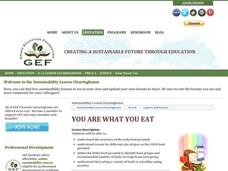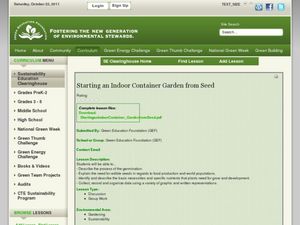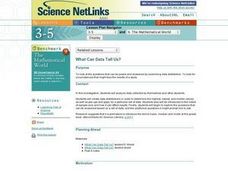Curated OER
Nutrition Label Scavenger Hunt
Students discover how to read nutrition labels. In this nutrition lesson, students review important vocabulary words, such as "sodium" and "calories." Students practice reading labels from various containers of food and participate in a...
Curated OER
Sort the Compost Bin
Students discover what compost is. For this composting lesson, students view a sample of a compost bin and define what the purpose of compost is. Students discuss what the compost bin consists of and sort the compost bin into the green...
Curated OER
You Are What You Eat
Students identify healthy food choices from the food groups on the USDA food pyramid. In this nutrition and health instructional activity, students identify and name examples of each food group displayed on the food pyramid....
Curated OER
Benefits of Indoor Plants
Students diagram a plant. In this Science lesson, students explore the concept of photosynthesis focusing on the oxygen production. Students calculate the amount of plants needed to filter the air in their classroom.
Curated OER
How Solar Cells Work
Middle schoolers create electricity. In this solar energy lesson, students role play how photovoltaic cells change sunlight into electricity. Middle schoolers discuss the experiment and create their own diagram of the...
Curated OER
Make a Solar Oven
Students build a solar oven. In this Science lesson, students construct a functional solar oven. Students design the oven and explain the energy concepts involved.
Curated OER
Starting an Indoor Container Garden from Seed
Students create an indoor container garden. In this container garden lesson plan, students explore seed germination. Students discuss edible seeds.
Curated OER
Trash to Gas
Middle schoolers experiment with biomass materials as alternative energy sources. In this biomass material lesson plan, students participate in an experiment with cow manure to determine how it can be used as an energy source. They...
Curated OER
Hot and Cold Colors
Students experiment with the color and solar energy absorption. In this color and solar energy absorption lesson, students spend two days discussing and experimenting with the concept of energy absorption. They paint cans with different...
Curated OER
Piecewise Linear Functions: Extending Stories to Graphs
Using this resource, scholars develop graphs that model situations by showing change over time. They answer 15 questions based on information from charts that show growth in weight. They extend the concepts to an assessment section of...
Curated OER
What Can Data Tell Us?
Students explore data distribution. For this data analysis lesson, students create a data distribution table by playing the game "Tower of Hanoi" from the Hall of Science. Students analyze their data and answer data driven questions.
Federal Reserve Bank
The Output Gap: A‘Potentially’ Unreliable Measure of Economic Health?
How can we accurately estimate what the economy should produce now and in the future? Have your pupils tackle this question as they learn about real versus potential GDP and as they review data regarding the output gap in...
Laboratory for Atmospheric and Space Physics
Planetary Distances on the Playground
There's no need to stay inside; get out of the classroom and create a scaled map of the solar system on your playground field! In collaborative groups, scholars identify the distance between the sun and other planets, place planet...
Laboratory for Atmospheric and Space Physics
Space Travel Guide
Looking to take a trip? Why not go to space? Here, scholars take on the role as travel agent to create a guide to their favorite planet including travel tips and sightseeing recommendations.
Laboratory for Atmospheric and Space Physics
A Classroom Solar System
Create a scaled model of our solar system in your classroom! Scholars work collaboratively to build paper mache planets and hang them in their proper position to showcase each planet's location in the solar system.
University of Colorado
Space Travel Guide
Neptune takes 164.8 Earth years to travel around the sun. In the fifth of 22 lessons, young scientists create a travel guide to a planet in our solar system. They provide tips for others on what to bring, what they see, and their...
University of Colorado
The Jovian System: A Scale Model
Jupiter has 67 moons! As the seventh in a series of 22, the exercise shows learners the size and scale of Jupiter and its Galilean moons through a model. They then arrange the model to show how probes orbited and gathered data.
University of Colorado
Strange New Planet
The first remote sensors were people in hot air balloons taking photographs of Earth to make maps. Expose middle school learners to space exploration with the use of remote sensing. Groups explore and make observations of a new...
University of Colorado
Planetary Distances on the Playground
Earth is 149,600,000 km, or 92,957,130.4 miles, from the sun. Young astronauts create an interactive model to learn the distances between planets. Nine groups, each representing a different planet, are spread around at class-calculated...
University of Colorado
Spacecraft Speed
Space shuttles traveled around Earth at a speed of 17,500 miles per hour, way faster than trains, planes, or automobiles travel! In the 13th installment of 22, groups graph different speeds to show how quickly spacecraft move through...
University of Colorado
Are All Asteroids' Surfaces the Same Age?
Did you know scientists can tell the age of an asteroid by looking closely at its craters? This final instructional activity of a six-part series focuses on two asteroids, Gaspra and Ida, in order to demonstrate the concept of dating...
Curated OER
Invisible Life
By setting up an aquarium in the classroom, learners are able to describe some macroscopic and microscopic organisms that are found inside. This well-designed, and educationally rich lesson requires pupils to use microscopes to view...
Curated OER
Comparing Fractions
Young mathematicians compare two fractions with like denominators and then move to the next level to compare fractions with unlike denominators. They will first try to use mental math to make educated guesses. There are a few guidelines...
Curated OER
Solving Equations and Formulas
Learners rearrange equations and formulas to solve for a specified variable. Includes multi-step equations with a variety of different variables and a few real-world applications. Great for use as a study guide when presenting the...























